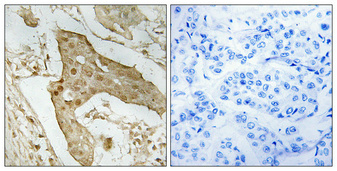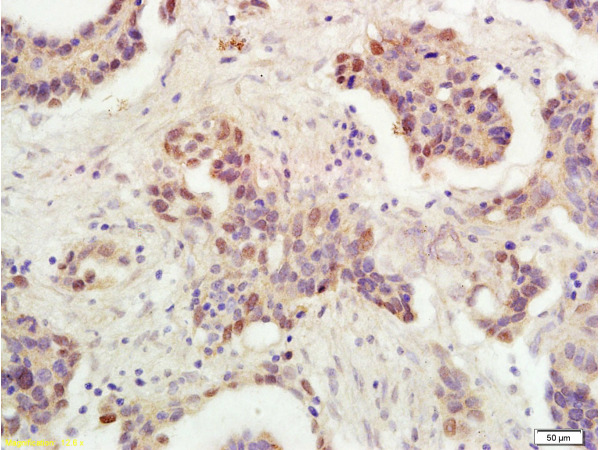p53 Antibody / TP53
ORB639969
ApplicationsFlow Cytometry, ImmunoFluorescence, Western Blot, ImmunoHistoChemistry, ImmunoHistoChemistry Paraffin
Product group Antibodies
ReactivityHuman
TargetTP53
Overview
- SupplierBiorbyt
- Product Namep53 Antibody / TP53
- Delivery Days Customer16
- Application Supplier NoteOptimal dilution of the antibody should be determined by the researcher.
- ApplicationsFlow Cytometry, ImmunoFluorescence, Western Blot, ImmunoHistoChemistry, ImmunoHistoChemistry Paraffin
- Applications SupplierFlow cytometry: 1-2ug/million cells in 0.1ml,Immunofluorescence: 1-2ug/ml,Western blot: 1-2ug/ml,Immunohistochemistry (FFPE): 0.25-0.5ug/ml FACS, IF, IHC-P, WB
- CertificationResearch Use Only
- ClonalityMonoclonal
- Clone IDDO-1
- ConjugateUnconjugated
- Gene ID7157
- Target nameTP53
- Target descriptiontumor protein p53
- Target synonymsBCC7, BMFS5, LFS1, P53, TRP53, cellular tumor antigen p53, antigen NY-CO-13, mutant tumor protein 53, phosphoprotein p53, transformation-related protein 53, tumor protein 53, tumor supressor p53
- HostMouse
- IsotypeIgG2a
- Protein IDP04637
- Protein NameCellular tumor antigen p53
- Scientific DescriptionRecognizes a 53kDa protein, which is identified as p53 suppressor gene product. It reacts with the mutant as well as the wild form of p53. Its epitope maps within the N-terminus (aa 20-25) of p53. Monoclonal antibody PAb1801 does not block the binding of DO-7 MAb to p53 in an ELISA test. p53 is a tumor suppressor gene expressed in a wide variety of tissue types and is involved in regulating cell growth, replication, and apoptosis. It binds to MDM2, SV40 T antigen and human papilloma virus E6 protein. Positive nuclear staining with p53 antibody has been reported to be a negative prognostic factor in breast carcinoma, lung carcinoma, colorectal, and urothelial carcinoma. Anti-p53 positivity has also been used to differentiate uterine serous carcinoma from endometrioid carcinoma as well as to detect intratubular germ cell neoplasia. Mutations involving p53 are found in a wide variety of malignant tumors, including breast, ovarian, bladder, colon, lung, and melanoma.
- ReactivityHuman
- Storage Instruction-20°C,2°C to 8°C
- UNSPSC12352203








